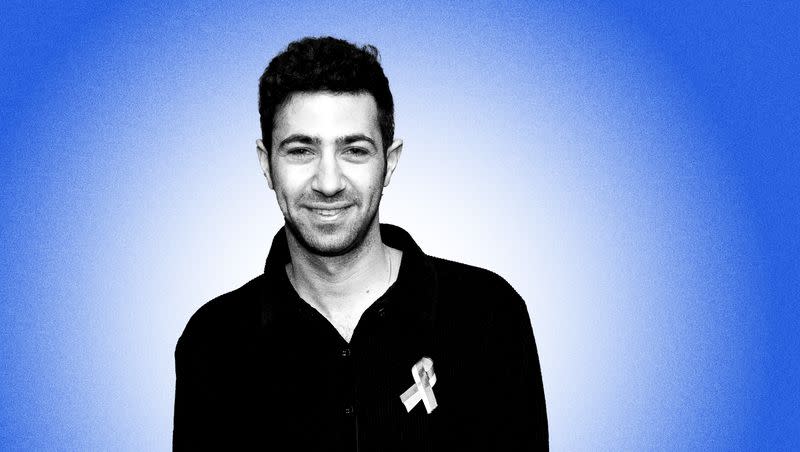Director on making a documentary about his grandmother who survived the Holocaust

- Oops!Something went wrong.Please try again later.
- Oops!Something went wrong.Please try again later.
More than 80 years ago, Nina was living in Poland at the start of World War II.
Sitting down on a mustard yellow chair with an iced coffee in a clear glass, she starts the documentary by saying “Hello ladies and gentlemen.” And then, she takes a sip. She soon begins talking about her older sister Irena — she hasn’t seen her since April 1943.
Nina is a survivor of the Holocaust. Six million Jewish people were killed including 25 members of Nina’s family.
Her story is close to heart of the film’s director, Daniel Lombroso. Nina is his grandmother.
“Nina & Irena” is a new story to Lombroso. “I never even knew you had a sister,” he said in the movie. The documentary won best short film at Mountainfilm in Colorado and is being considered for the 2024 Academy Awards, per Deadline. It’s currently available to stream via The New Yorker.
Filmmaker Errol Morris (known for “Gates of Heaven” and “The Fog of War”) presented the film.
After Lombroso made his breakout documentary “White Noise,” he did an environmental film about the border wall and a look at one of the most dangerous types of plastic surgery.
But then he said he had a realization “the generation that survived the Holocaust is disappearing very quickly.”
His grandmother Nina and other survivors of the Holocaust are growing older and eventually, all survivors will pass on.
Seeing resurgent antisemitism and Holocaust denial, Lombroso wanted to keep the memory of survivors alive. It was “the main reason” he made the film.
“I think every year as survivors disappear and the links to the past become more tenuous, denialism becomes more extreme,” he said. Antisemitism has been rising for the last several years and is on the increase as the Israel-Hamas war continues.
The movie was made before the war started, Lombroso said. He thinks what has happened in Gaza and Israel is tragic.
Lombroso believes that hearing from Holocaust survivors about the suffering of the Jewish people can help move people away from antisemitism. “Seeing a real living person who went through that and sympathizing with them” is something that he believes can change hearts and minds.
Stories of Holocaust survivors were familiar to Lombroso. He grew up “not particularly religious, but around a lot of Jewish people and around survivors.”
But a lot of Nina’s story was new to Lombroso. “I never even knew you had a sister,” he said in the documentary. Nina didn’t talk much about her family’s experience when Lombroso was growing up.
“No, well look. I didn’t talk about that time of my life. First of all, nobody was interested. You didn’t talk about it,” Nina replied. “Two, I felt that if I start telling my story the way it really happened, it was too depressing or too horrifying for the kids when they were small.”
Lombroso clarified that he only had a vague sense that Nina had a sister. “I never asked her who the picture was of the young woman on her piano.” Hearing his grandmother’s story caused him to reflect on his own life. He has a brother six years older than him and can’t imagine what it would be like to lose them.
Whenever the film is screened, members of the audience come up to Lombroso and tell him about members of their families who have lived through dictatorships and authoritarian regimes where their lives may have been at risk.
Who Nina lost as a result of the Nazis’ state-sponsored genocide is part of the movie.
“She lost 20, 25 family members — her sister. The Holocaust was the total decimation of a people,” Lombroso said.
The documentary features Nina talking about what it was like to go through the Holocaust. It also includes details about what her life was like when she moved to America and have a family.
“She taught herself English, her father was in his late 50s or 60s and faced age discrimination getting a job,” he said. “... In America, they had no money. You lost all your assets in the Holocaust.”
While the film highlights Nina and her family’s sufferings and struggles, it also focuses on her other qualities.
“I hope that you can see this beautiful, vibrant, amazing, funny woman who went through this and survived and built a life,” he said. As much as it is an emotional documentary, Lombroso said there’s “tenderness” and “love and warmth” woven throughout it.
It’s because of how he feels about his grandmother. For him, it’s a documentary principle that the subject has no control over their portrayal, but Lombroso said the way he feels about her comes through.
Making the movie about her brought the two of them closer together. “We actually just got a call from Kamala Harris’ team and they invited me and her to their Hanukkah party, so I’m going to Washington with her this weekend.”

